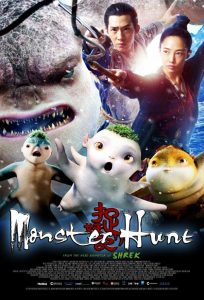
Alan Yuen created a universe in which humans and monsters coexist. Monsters reside in the forest, while the humans stay put in their kingdoms. There are monster hunters who look to eradicate what they perceive as a threat, while there are monsters who try and convince the humans that they can be friendly. This opens up an entire world for Alan to create intricate stories and create unique monsters. It’s why it’s such a shame he doesn’t capitalize on this.
The story that Yuen wrote is a bland retread of the sitcom staple: unfit individuals being brought together to raise a child. The only twist this time around is that the child is a mutated radish. Yuen doesn’t even bother mining material from this unique twist, as the monster just acts like a human baby would. He makes cute faces, plays games with the makeshift parents, and unintentionally engages in slapstick scenarios. The only quirk he brings to the table is that he can shoot vegetables out of his mouth at rapid speed, causing them to penetrate as fiercely as bullets. That is cute and clever, which is what Yuen’s screenplay needed more of!
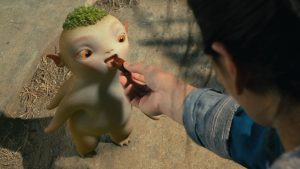
Raman Hui’s direction isn’t much better. He was co-director on “Shrek the Third,” which was the laziest in the series. He has a knack for approaching fairy tales in the most basic of ways instead of exploring the unlimited potential in which they yield. That’s the beauty of fairy tales: telling ordinary stories with a magical spin. What’s the point in introducing fantastical elements if all you’re going to use it for is routine slapstick? Slapstick in which would work in a normal setting, let alone with the advent of monsters.
Hui is not concerned with the fantastical, unfortunately. The monsters and humans only exist to fuel the slapstick, as opposed to adding to it. The adoptive parents of the monster baby are Tianyin Song (Jing Boran) and Xiaolan Huo (Bai Baihe), both of whom are monster hunters. Huo is more aggressive, while Tianyin is more sensitive, a gender reversal on the common trope that men are gruff and women are caring. He only hunts bad monsters while she views all monsters as bad. The two are brought together during a chance encounter with monsters disguised as humans. The Queen senses Tianyin’s tenderness, entrusting him to protect her newborn from both vicious monster hunters and the Monster Hunt Bureau Chief Ge (Wallace Chung).
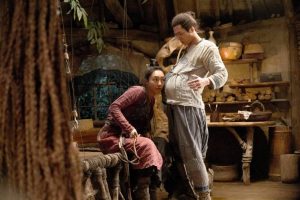
There’s only one problem in this scenario: the baby hasn’t been born yet. Through magic, the Queen impregnates Tianyin for the sole purpose of slapstick. Even then, it’s barely explored, as all he does is eat constantly. His birth comes too quickly to milk any side effects that come with pregnancies, and the eventual birthing scene is played out. Huo barks orders at him to push, then tries to give him a C-section. All the while a couple is just outside their hotel room, exasperated by what they hear. Said couple continually get fleeting glimpses of what’s going on, only for our unlikely protagonists to use the monsters’ human disguises as decoys. It’s been done before and done much better.
The story then plays out as you’d expect. Tianyin grows attached to the baby monster, the selfish and stubborn Huo is slowly made soft by both the baby and the man, they sell the monster on the black market to be made into food at an exotic restaurant, they immediately have regrets and go back to save the monster, then have a final showdown with the criminally underdeveloped villain, Ge. There is but one ingenious scenario that flips a common trope on its head. We are made to believe the baby monster had succumbed to the chef’s cooking, only to cut back to reveal he’s impervious to it. Any and all cooking techniques, such as frying, grilling, sautéing, and even chopping him up into little pieces, doesn’t work. We’re never given a reason as to why, but are willing to accept it as the monster’s special power in exchange for the laughs it provides. Even the criticism of it stripping away any tension this scenario could and should provide falls on deaf ears, as the funniest aspect is knowing our heroes are scrambling to save a creature that doesn’t actually need to be saved.
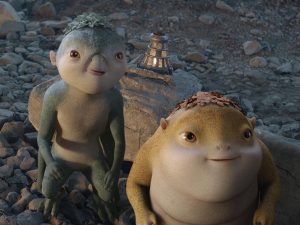
Cute and creative moments such as that are far and few between in “Monster Hunt.” Even elements such as Huo’s ability to use magic and a rival monster hunter trailing our heroes are downplayed. It’s all presented as either convenient solutions to problems or as minor hurdles our heroes encounter on their quest. This would be fine if they had any semblance of development, but for magic to appear out of nowhere just to move along the story feels incredibly cheap. Not only that, but it’s a tease, as well. Why introduce elements of vast potential only to keep them in the background? Play around with the magic, don’t hide it!
“Monster Hunt” will please the kids it’s targeted to. Judging by its gargantuan box office success in native China, it has pleased a lot of people! That doesn’t mean it can’t aspire to be more. Why not explore the elements further? It’s not as if children are going to be opposed to more creatures, more magic, and more creative uses of them. More so, why not go full force with the slapstick? If you’re going to present the monster battles as a Looney Tunes cartoon, such as the shark who comically lost all of his teeth in a fight, then go full bore with it! Don’t keep it contained to the occasional battle, but have it encompass the entire film.
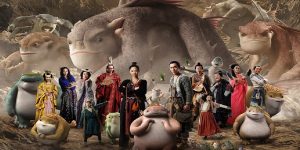
There will no doubt be sequels to “Monster Hunt.” This was the plan all along, what with the open-ended conclusion. I just hope Yuen explores the universe in which he created more, and that Hui doesn’t resort to just commonplace slapstick. This series has untapped potential that I hope will be touched upon.
Final Rating: C+
